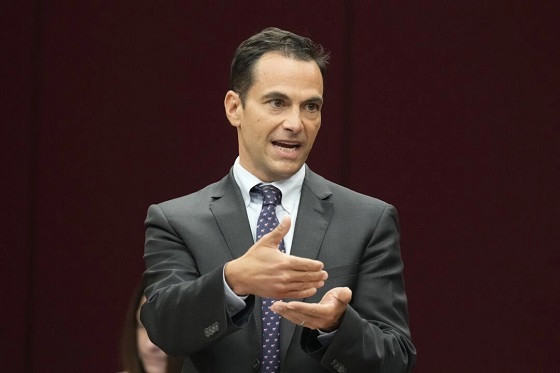Business
Apple Settles $95M Class Action Over Siri Privacy Violations
If you’re tired of censorship and surveillance, subscribe to Reclaim The Net.
Millions of Siri users may receive compensation as Apple addresses claims of unintentional voice recordings and data misuse
Apple has agreed to a $95 million cash settlement to resolve a proposed class action lawsuit accusing the tech giant of breaching user privacy through its Siri voice assistant. The preliminary settlement, filed in a federal court in Oakland, California, awaits approval from US District Judge Jeffrey White.
The lawsuit alleged that Siri recorded private conversations inadvertently activated by users and disclosed these recordings to third parties, including advertisers.
Siri, like other voice assistants, responds to “hot words” such as “Hey, Siri,” which can unintentionally trigger recording. Plaintiffs claimed this led to targeted ads based on private discussions, citing examples such as ads for Air Jordan sneakers after casual mentions of the brands. One plaintiff also reported receiving ads for a surgical treatment brand after a private conversation with their doctor.
The lawsuit covers users of Siri-enabled devices, including iPhones and Apple Watches, from September 17, 2014, when the “Hey, Siri” feature was introduced, to December 31, 2024. Class members, estimated to number in the tens of millions, could receive up to $20 per eligible device.
Apple denied any wrongdoing in agreeing to the settlement and did not immediately comment on the matter.
Similarly, the plaintiffs’ attorneys have yet to issue statements. From the $95 million settlement fund, attorneys may seek up to $28.5 million in legal fees and an additional $1.1 million for expenses.
For Apple, the settlement represents a fraction of its financial might, equivalent to just nine hours of profit. The Cupertino-based company reported a net income of $93.74 billion in its most recent fiscal year.
This lawsuit isn’t the only privacy-related legal battle involving voice assistants. A separate case against Google’s Voice Assistant is ongoing in a federal court in San Jose, California, within the same judicial district. The same law firms represent the plaintiffs in both lawsuits.
Business
Will Paramount turn the tide of legacy media and entertainment?


From the Daily Caller News Foundation
The recent leadership changes at Paramount Skydance suggest that the company may finally be ready to correct course after years of ideological drift, cultural activism posing as programming, and a pattern of self-inflicted financial and reputational damage.
Nowhere was this problem more visible than at CBS News, which for years operated as one of the most partisan and combative news organizations. Let’s be honest, CBS was the worst of an already left biased industry that stopped at nothing to censor conservatives. The network seemed committed to the idea that its viewers needed to be guided, corrected, or morally shaped by its editorial decisions.
This culminated in the CBS and 60 Minutes segment with Kamala Harris that was so heavily manipulated and so structurally misleading that it triggered widespread backlash and ultimately forced Paramount to settle a $16 million dispute with Donald Trump. That was not merely a legal or contractual problem. It was an institutional failure that demonstrated the degree to which political advocacy had overtaken journalistic integrity.
Dear Readers:
As a nonprofit, we are dependent on the generosity of our readers.
Please consider making a small donation of any amount here.
Thank you!
For many longtime viewers across the political spectrum, that episode represented a clear breaking point. It became impossible to argue that CBS News was simply leaning left. It was operating with a mission orientation that prioritized shaping narratives rather than reporting truth. As a result, trust collapsed. Many of us who once had long-term professional, commercial, or intellectual ties to Paramount and CBS walked away.
David Ellison’s acquisition of Paramount marks the most consequential change to the studio’s identity in a generation. Ellison is not anchored to the old Hollywood ecosystem where cultural signaling and activist messaging were considered more important than story, audience appeal, or shareholder value.
His professional history in film and strategic business management suggests an approach grounded in commercial performance, audience trust, and brand rebuilding rather than ideological identity. That shift matters because Paramount has spent years creating content and news coverage that seemed designed to provoke or instruct viewers rather than entertain or inform them. It was an approach that drained goodwill, eroded market share, and drove entire segments of the viewing public elsewhere.
The appointment of Bari Weiss as the new chief editor of CBS News is so significant. Weiss has built her reputation on rejecting ideological conformity imposed from either side. She has consistently spoken out against antisemitism and the moral disorientation that emerges when institutions prioritize political messaging over honesty.
Her brand centers on the belief that journalism should clarify rather than obscure. During President Trump’s recent 60 Minutes interview, he praised Weiss as a “great person” and credited her with helping restore integrity and editorial seriousness inside CBS. That moment signaled something important. Paramount is no longer simply rearranging executives. It is rethinking identity.
The appointment of Makan Delrahim as Chief Legal Officer was an early indicator. Delrahim’s background at the Department of Justice, where he led antitrust enforcement, signals seriousness about governance, compliance, and restoring institutional discipline.
But the deeper and more meaningful shift is occurring at the ownership and editorial levels, where the most politically charged parts of Paramount’s portfolio may finally be shedding the habits that alienated millions of viewers.The transformation will not be immediate. Institutions develop habits, internal cultures, and incentive structures that resist correction. There will be internal opposition, particularly from staff and producers who benefited from the ideological culture that defined CBS News in recent years.
There will be critics in Hollywood who see any shift toward balance as a threat to their influence. And there will be outside voices who will insist that any move away from their preferred political posture is regression.
But genuine reform never begins with instant consensus. It begins with leadership willing to be clear about the mission.
Paramount has the opportunity to reclaim what once made it extraordinary. Not as a symbol. Not as a message distribution vehicle. But as a studio that understands that good storytelling and credible reporting are not partisan aims. They are universal aims. Entertainment succeeds when it connects with audiences rather than instructing them. Journalism succeeds when it pursues truth rather than victory.
In an era when audiences have more viewing choices than at any time in history, trust is an economic asset. Viewers are sophisticated. They recognize when they are being lectured rather than engaged. They know when editorial goals are political rather than informational. And they are willing to reward any institution that treats them with respect.
There is now reason to believe Paramount understands this. The leadership is changing. The tone is changing. The incentives are being reassessed.
It is not the final outcome. But it is a real beginning. As the great Winston Churchill once said; “Now this is not the end. It is not even the beginning of the end. But it is, perhaps, the end of the beginning”.
For the first time in a long time, the door to cultural realignment in legacy media is open. And Paramount is standing at the threshold and has the capability to become a market leader once again. If Paramount acts, the industry will follow.
Bill Flaig and Tom Carter are the Co-Founders of The American Conservatives Values ETF, Ticker Symbol ACVF traded on the New York Stock Exchange. Ticker Symbol ACVF
Learn more at www.InvestConservative.com
Business
Parliamentary Budget Officer begs Carney to cut back on spending

PBO slices through Carney’s creative accounting
The Canadian Taxpayers Federation is calling on Prime Minister Mark Carney to cut spending following today’s bombshell Parliamentary Budget Officer report that criticizes the government’s definition of capital spending and promise to balance the operating budget.
“The reality is that Carney is continuing on a course of unaffordable borrowing and the PBO report shows government messaging about ‘balancing the operating budget’ is not credible,” said Franco Terrazzano, CTF Federal Director. “Carney is using creative accounting to hide the spiralling debt.”
Carney’s Budget 2025 splits the budget into operating and capital spending and promises to balance the operating budget by 2028-29.
However, today’s PBO budget report states that Carney’s definition of capital spending is “overly expansive.” Without using that “overly expansive” definition of capital spending, the government would run an $18 billion operating deficit in 2028-29, according to the PBO.
“Based on our definition, capital investments would total $217.3 billion over 2024-25 to 2029-30, which is approximately 30 per cent ($94 billion) lower compared to Budget 2025,” according to the PBO. “Moreover, based on our definition, the operating balance in Budget 2025 would remain in a deficit position over 2024-25 to 2029-30.”
The PBO states that the Carney government is using “a definition of capital investment that expands beyond the current treatment in the Public Accounts and international practice.” The report specifically points out that “by including corporate income tax expenditures, investment tax credits and operating (production) subsidies, the framework blends policy measures with capital formation.”
The federal government plans to borrow about $80 billion this year, according to Budget 2025. Carney has no plan stop borrowing money and balance the budget. Debt interest charges will cost taxpayers $55.6 billion this year, which is more than the federal government will send to the provinces in health transfers ($54.7 billion) or collect through the GST ($54.4 billion).
“Carney isn’t balancing anything when he borrows tens of billions of dollars every year,” Terrazzano said. “Instead of applying creative accounting to the budget numbers, Carney needs to cut spending and debt.”
-

 Business2 days ago
Business2 days agoMark Carney Seeks to Replace Fiscal Watchdog with Loyal Lapdog
-

 COVID-192 days ago
COVID-192 days agoMajor new studies link COVID shots to kidney disease, respiratory problems
-

 Business2 days ago
Business2 days agoP.E.I. Moves to Open IRAC Files, Forcing Land Regulator to Publish Reports After The Bureau’s Investigation
-

 Energy2 days ago
Energy2 days agoCanada’s oilpatch shows strength amid global oil shakeup
-

 International1 day ago
International1 day agoBondi and Patel deliver explosive “Clinton Corruption Files” to Congress
-

 International1 day ago
International1 day agoState Department designates European Antifa groups foreign terror organizations
-

 Business18 hours ago
Business18 hours agoCarney government needs stronger ‘fiscal anchors’ and greater accountability
-

 International1 day ago
International1 day agoIs America drifting toward civil war? Joe Rogan thinks so








